27 Aug 15 | Bahrain, Bahrain Statements, Campaigns, mobile, Statements
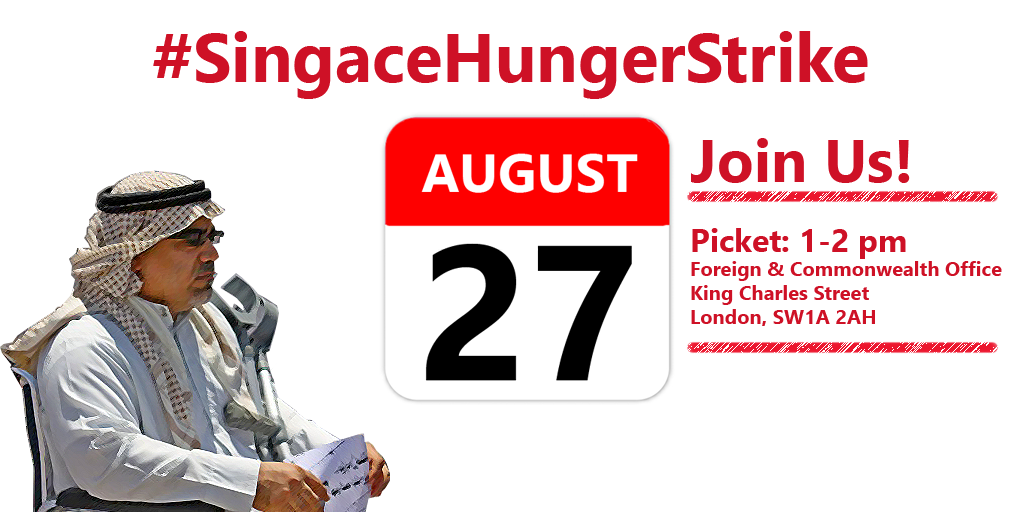
Dr Abduljalil al-Singace is a prisoner of conscience and a member of the Bahrain 13, a group of activists arrested by the Bahraini government for their role in peaceful protests in 2011. Dr al-Singace is a blogger, academic, and former Head of Mechanical Engineering at the University of Bahrain. Dr al-Singace is currently serving a life sentence ordered by a military court on 22 June 2011.
The Bahrain Independent Commission of Inquiry met with Dr al-Singace in 2011 and collected testimony regarding his arbitrary arrest and torture. Despite the existence of this testimony, in 2012 a civilian appeals court refused to investigate Dr al-Singace’s credible allegations of abuse and upheld the military court’s decision. Dr al-Singace has received no compensation for the acts of torture that he suffered, nor have his torturers been held accountable for their actions.
On 21 March 2015, Dr al-Singace went on hunger strike in protest at the collective punishment and acts of torture that police inflicted upon prisoners following a riot in Jau Prison earlier that month. Today, he passed 160 days of hunger strike.
Dr al-Singace suffers from post-polio syndrome and is disabled. In addition to the torture Dr al-Singace has suffered, his medical conditions have deteriorated considerably as a result of his incarceration. Prison and prison hospital authorities have denied him physiotherapy and surgery to his nose and ears. He is currently being held in solitary confinement in a windowless room in Al-Qalaa hospital.
We remind the Bahraini government of its obligations under the International Covenant on Civil and Political Rights (ICCPR), which Bahrain acceded to in 2006. Under the ICCPR Bahrain must ensure that no individual is subjected to arbitrary detention (Article 9) and that everyone enjoys the right to freedom of expression (Article 19). We demand that the government release all individuals who are arbitrarily detained for exercising their right to free expression, whether through peaceful assembly, online blogging or other means. We also remind the Bahraini government of its obligations arising from the 1984 Convention against Torture and Other Cruel, Inhuman, or Degrading Treatment or Punishment (CAT), to which Bahrain is a state party. In 2015, the UN Working Group on Arbitrary Detention found that arbitrary detention and torture are used systematically in the criminal justice system of Bahrain.
We, the undersigned NGOs, call on the Bahraini authorities to release Dr Abduljalil al-Singace and all prisoners of conscience in Bahrain.
We further call on the international community, and in particular EU member states and the United States, to demand release of Dr al-Singace.
Background Information
Dr al-Singace has been the target of judicial harassment since 2009, when he was arrested for the first time and charged with participating in a terror plot and inciting hatred on his blog, Al-Faseela, which was subsequently banned by Bahraini Internet Service Providers. Dr al-Singace had blogged prolifically and critically against governmental corruption in Bahrain. He was later pardoned by the King and released, although his blog remained banned in Bahrain.
In August 2010, police arrested Dr al-Singace on his return from London, where he had spoken at an event hosted by the House of Lords on Bahrain. A security official at the time claimed he had “abused the freedom of opinion and expression prevailing in the kingdom.”[1] Following his arrest, Bahraini security forces subjected Dr al-Singace to acts of physical torture.
Dr al-Singace received a second royal pardon alongside other political prisoners in February 2011. He was rearrested weeks later in March following the imposition of a state of emergency and the intervention of the Peninsula Shield Force, an army jointly composed of the six Gulf Cooperation Council countries.
On 22 June 2011, a military court sentenced Dr al-Singace to life imprisonment. He is one of thirteen leading human rights and political activists arrested in the same period, subjected to torture, and sentenced in the same case, collectively known as the “Bahrain 13”. A civilian appeals court upheld the sentence on 22 May 2012. The “Bahrain 13” are serving their prison sentences in the Central Jau Prison. Among the “Bahrain 13”, Ebrahim Sharif, former leader of the secular political society Wa’ad, was released by royal pardon on 19 June 2015, but was rearrested weeks later on 11 July, following a speech in which he criticized the government. He currently faces charges of inciting hatred against the regime. On 9 July 2015, the EU Parliament passed an Urgent Resolution calling for the immediate and unconditional release of the “Bahrain 13” and other prisoners of conscience in Bahrain.
During his time in prison, authorities have consistently denied Dr al-Singace the regular medical treatment he requires for his post-polio syndrome, and have failed to provide him with the surgery he requires as a result of the physical torture to which he was subjected in 2011. Dr al-Singace has an infected ear, suffers from vertigo, and has difficulty breathing.
A combination of poor quality prison facilities, overcrowding, systematic torture and ill-treatment led to a riot in Jau Prison on 10 March 2015. Though a minority of prisoners participated in the riot, police collectively punished prisoners, subjecting many of them to torture. Authorities starved prisoners, arbitrarily beat them, and forced them to sleep in courtyards for days, until large tents were erected. Fifty-seven prisoners are currently on trial for allegedly instigating the riot.
In response to these violations, Dr al-Singace began a hunger strike on 21 March. It has now been 160 days since Dr al-Singace has eaten solid foods, and he has lost over 20 kilograms in weight. Dr al-Singace subsists on water, drinking over four litres daily, fizzy drinks for sugar, nutritional supplements, saline injections and yoghurt drink. His intake is monitored by hospital nurses.
Since the start of Dr al-Singace’s hunger strike, he has been transferred to Al-Qalaa Hospital for prisoners, where he has been kept in solitary confinement in a windowless room and has irregular contact with medical staff and family. Prison authorities prevented condolence visits to attend his nephew’s and mother-in-law’s funerals. Dr al-Singace should be immediately released, allowed to continue his work and given full access to appropriate medical treatment without condition.
Americans for Democracy and Human Rights in Bahrain (ADHRB)
ARTICLE 19
Bahrain Centre for Human Rights (BCHR)
Bahrain Human Rights Observatory
Bahrain Human Rights Society
Bahrain Institute of Rights and Democracy (BIRD)
Bahrain Press Association
Bahrain Youth Society for Human Rights
Cairo Institute for Human Rights Studies (CIHRS)
Canadian Journalists for Free Expression (CJFE)
CIVICUS: World Alliance for Citizen Participation
Committee to Protect Journalists (CPJ)
English Pen
Ethical Journalism Network
European – Bahraini Organisation for Human Rights (EBOHR)
European Center for Constitutional and Human Rights (ECCHR)
Front Line Defenders
Gulf Center for Human Rights (GCHR)
Index on Censorship
International Forum for Democracy and Human Rights (IFDHR)
Irish Pen
Khiam Rehabilitation Center for Victims of Torture (KRC)
Maharat Foundation
Mothers Legacy Project
No Peace Without Justice
PEN American Center
PEN Canada
Pen International
Project on Middle East Democracy (POMED)
Rafto Foundation
Redress
Reporters Without Borders
Salam for Democracy and Human Rights
Sentinel Human Rights Defenders
Shia Rights Watch
The Arabic Network for Human Rights Information (ANHRI)
The European Centre for Democracy and Human Rights (ECDHR)
The International Federation for Human Rights (FIDH)
Tunisia Initiative for Freedom of Expression
Vivarta
Wales PEN Cymru
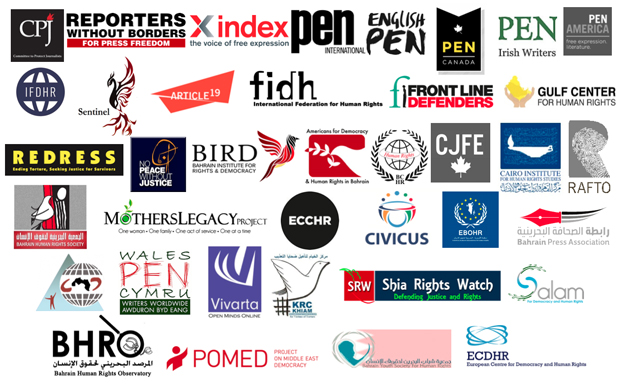
03 Jul 15 | Academic Freedom, Bahrain, Bahrain Statements, Campaigns, mobile
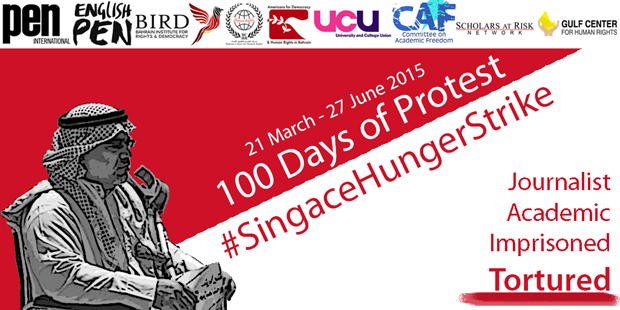
Nine Bahraini and international NGOs and the University College Union launched a campaign this week marking the 100th day of detained human rights defender Dr Abduljalil Al-Singace’s hunger strike.
The Bahrain Institute for Rights and Democracy (BIRD), Americans for Democracy & Human Rights in Bahrain (ADHRB), Bahrain Center for Human Rights (BCHR), Gulf Center for Human Rights (GCHR), English PEN, PEN International, Index on Censorship, Scholars at Risk, Committee on Academic Freedom of the Middle East Studies Association and the University College Union have joined together to express their solidarity with the imprisoned activist.
Dr Al-Singace, a prominent academic and blogger who promoted human rights in Bahrain throughout the 2000s, began a hunger strike on 21 March in protest of the ill-treatment of inmates and the poor, unsanitary conditions at Jaw Prison in Bahrain.
Police arrested Dr Al-Singace for his participation in the peaceful Arab Spring protests in 2011. During his initial detention, security officials subjected Dr Al-Singace to torture and ill-treatment, including forced standing, verbal and sexual assault, beatings, and prolonged solitary confinement. He was tried by a military court in June 2011 and sentenced to life in prison for allegedly plotting to overthrow the government.
Dr Al-Singace suffers from post-polio syndrome, heart, eye, and sinus problems, and requires urgent nasal and ear surgery. Prison authorities have denied Dr Al-Singace specialist medical treatment.
He is detained in solitary confinement at Al-Qalaa Hospital and is not permitted to go outdoors. He is denied access to novels, television, radio, and even pen and paper. He is also not allowed access to religious books and prayer beads, and was not permitted a condolence visit when his nephew died.
We, the aforementioned NGOs, call for the immediate and unconditional release of Dr Abduljalil Al-Singace in addition to all human rights defenders and activists in Bahrain who are detained in violation of Article 19 of the International Covenant on Civil and Political Rights, to which Bahrain is a state party. We demand that Dr Al-Singace receives full access to specialised medical attention as a matter of urgency. We remind Bahrain of its obligations to comply with the UN Standard Minimum Rules for the Treatment of Prisoners. We also call on Bahrain to fully investigate the allegations of ill treatment and torture at Jaw Prison, in line with its obligations under the Convention against Torture.
To express your solidarity with Dr Al-Singace, please take urgent action here:
1. Urge UK MPs to sign an early day motion on Bahrain
2. Sign the petition at English PEN
2. Write a letter via Scholars at Risk call for Action
We also invite you to join our social media campaign and to tweet using the hashtag #SingaceHungerStrike.
07 Oct 15 | Bahrain, Bahrain Statements, Campaigns, mobile
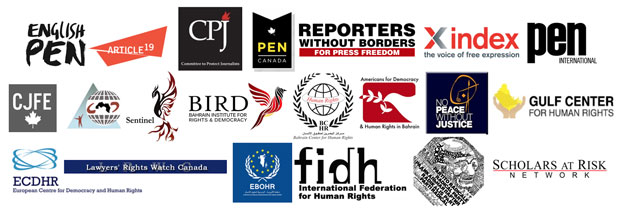
Today marks the 200th day of Bahraini prisoner of conscience Dr Abduljalil al-Singace’s protest. Since 21 March, Dr al-Singace has boycotted all solid food in protest of the treatment of inmates at the Central Jau Prison.
We, the undersigned NGOs, call for Dr al-Singace’s immediate and unconditional release, and the release of all political prisoners detained in Bahrain. We voice our solidarity with Dr al-Singace’s continued protest and call on the United Kingdom and all European Union member states, the United States and the United Nations to raise his case, and the cases of all prisoners of conscience, with Bahrain, both publicly and privately.
Dr al-Singace is a former Professor of Engineering at the University of Bahrain, an academic and a blogger. He is a 2007 Draper Hills Fellow at Stanford University’s Center on Democracy Development, and the Rule of Law. He has long campaigned for an end to torture and political reform, writing on these and other subjects on his blog, Al-Faseela. Bahraini Internet Service Providers continue to ban access to the blog and Dr al-Singace has suffered arbitrary detention and torture on multiple occasions. In June 2011, a military court sentenced Dr al-Singace to life imprisonment alongside other prominent protest leaders, collectively known as the ‘Bahrain 13’. He is considered a prisoner of conscience.
Dr al-Singace’s current protest began in response to the violent response of the Ministry of Interior to a riot that took place in the Central Jau Prison on 10 March 2015. Though only a minority of inmates participated in the riot, police collectively punished all detainees, subjecting them to beatings and other humiliating and degrading acts; depriving them of sleep and food; and denying them access to sanitation facilities. Dr al-Singace objects to the humiliating treatment and arbitrary detention to which prison authorities subject him and other prisoners of conscience. Additionally, Dr al-Singace rejects being labelled a criminal, as the government convicted him in 2011 on grounds relating to his peaceful exercise of his freedoms of speech and assembly.
Since Dr al-Singace began his protest, the international community has expressed concerns over the treatment of inmates at Bahrain’s largest prison complex and the condition of Dr al-Singace in particular. The UN High Commissioner for Human Rights raised the issue of torture in Bahrain’s prisons in June. In July, the European Parliament passed a resolution on Bahrain calling for the unconditional release of prisoners of conscience, naming Dr al-Singace. The United States clarified its concerns regarding Dr al-Singace in August. The United Kingdom has also expressed its concerns over Bahrain.
In June 2015, NGOs launched a social media campaign for Dr al-Singace – #singacehungerstrike – alongside the University College Union. Since then, NGOs also organised protests outside the Bahrain Embassy, London, and the UK Foreign and Commonwealth Office. On 27 August, the 160th day of Dr al-Singace’s protest, 41 NGOs issued an urgent appeal for the release of Dr al-Singace.
For over six months, Dr al-Singace has subsisted on water, fluids and IV injections for sustenance. He is currently interred at the prison clinic. Prison authorities seem to have finally begun to take notice of the international attention his case is attracting, as Dr al-Singace recently received treatment for a nose injury he suffered during his torture in 2011. He had waited over four years to receive such treatment. He also suffered damage to his ear as a result of torture, but has not received adequate medical attention for this injury.
According to Dr al-Singace’s family, the prison authorities will only transfer him to a civilian hospital for treatment if he agrees to wear a prisoner’s uniform, which he refuses to do on the grounds that he is a prisoner of conscience and not a criminal. Since the beginning of his protest, Dr al-Singace has lost 20 kilograms in weight. He is often dizzy and his hair is falling out. He survives on nutritional drinks, oral rehydration salts, glucose, water and an IV drip, and his family states that he is “on the verge of collapse.”
In the prison clinic, Dr al-Singace is not allowed to leave the building and is effectively held in solitary confinement. Though the clinic staff tends to him, he is not allowed to interact with other prison inmates and his visitation times are irregular. Authorities have now lifted an unofficial ban on Dr al-Singace receiving writing and reading materials, but access is still limited: prison staff have now given him a pen, but have still not allowed him access to any paper. The government has also denied Dr al-Singace permission to receive magazines sent to him in an English PEN-led campaign, despite promising to allow him to do so. He has no ready access to television, radio or print media.
We demand Dr Abduljalil al-Singace’s immediate release, and urge the international community to raise his case with Bahrain.
Signatories:
Americans for Democracy & Human Rights in Bahrain (ADHRB)
ARTICLE 19
Bahrain Centre for Human Rights (BCHR)
Bahrain Institute of Rights and Democracy (BIRD)
Canadian Journalists for Free Expression (CJFE)
Committee to Protect Journalists (CPJ)
English Pen
European – Bahraini Organisation for Human Rights (EBOHR)
Gulf Centre for Human Rights (GCHR)
Index on Censorship
International Federation for Human Rights (FIDH)
Lawyer’s Rights Watch Canada (LRWC)
No Peace Without Justice (NPWJ)
PEN Canada
PEN International
Reporters Without Borders (RSF)
Scholars at Risk Network (SAR)
Sentinel Human Rights Defenders
The Arabic Network for Human Rights Information (ANHRI)
The European Centre for Democracy and Human Rights (ECDHR)
The Nonviolent Radical Party Transnational and Transparty (NRPTT)
For more and background information, read the previous statement here.
17 Aug 16 | Academic Freedom, Bahrain, Campaigns -- Featured, Middle East and North Africa, mobile, News and features
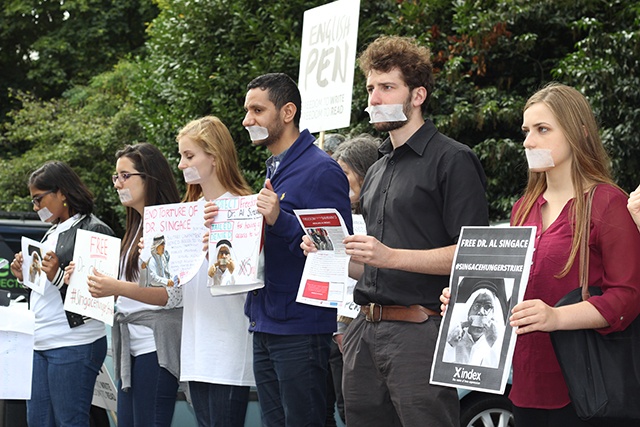
Protesters in London demand the release of Abduljalil al-Singace, July 2015.
One year has passed since Index on Censorship magazine editor Rachael Jolley sent a copy of the publication – Fired, Threatened, Imprisoned… Is Academic Freedom Being Eroded? – to jailed Bahraini academic, human rights activist and writer Abduljalil al-Singace to mark his 150 days on hunger strike.
Al-Singace’s hunger strike ended on 27 January 2016 after 313 days, but he remains in prison.
In a letter accompanying the magazine, Jolley aired concerns that al-Singace – who had been protesting prison conditions while being held in solitary confinement – had suffered torture and called on the Bahraini authorities to ensure he “had access to the medical treatment he urgently requires”.
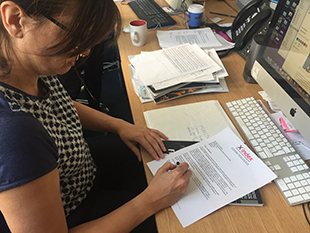
Index magazine editor Rachael Jolley pens letter to Bahrain’s Ministry of Interior regarding al-Singace, 17 August 2015.
On 15 March 2011 Bahrain’s king brought in a three-month state of emergency, which included the through establishing of military courts known as National Safety Courts. The aim of the decree was to quell a series of demonstrations that began following a deadly night raid on 17 February 2011 against protesters at the Pearl Roundabout in Manama, when four people were killed and around 300 injured.
Over 300 individuals were subsequently convicted through National Safety Courts, often for speaking out against the government or exercising their right to assemble freely. Many were punished simply for supporting or being part of the country’s opposition movement.
On a midnight raid at his home on 17 March 2011, al-Singace was arrested at gunpoint. During the arrest, he was beaten, verbally abused and his family threatened with rape. Disabled since his youth, al-Singace was forced to stand without his crutches for long periods of time during his arrest. Masked men also kicked him until he collapsed. The Bahraini authorities placed him in solitary confinement for two months. During this time the guards starved him, beat him and sexually abused him.
Al-Singace is part of what is known as the Bahrain 13, a group of peaceful activists and human rights defenders imprisoned in Bahrain in connection with their role in the February 2011 protests.
On 22 June 2011 a military court sentenced all members of the Bahrain 13 to between five years and life in prison, on trumped-up charges of attempting to overthrow the regime, “broadcasting false news and rumours” and “inciting demonstrations”.
Evidence used against them was extracted under torture, but this didn’t prevent their sentences being upheld on appeal in September 2011, at a civilian court in May 2012 and in January 2013 at the Court of Cassation. The Bahrain 13 has now exhausted all domestic remedies and are currently serving their sentences Jau prison, notorious for torture and ill treatment.
During their arrest and detention, the Bahrain 13 were subject to beatings, torture, sexual abuse and threats of violence and rape towards themselves and members of their family by police and prison authorities. Eleven of the 13 remain in prison.
The group consists of:
Al-Singace
Sheikh Abduljalil al-Muqdad, a religious cleric and a co-founder of the al-Wafaa Political Society. During his detention he has been beaten, tortured and told his wife would be raped.
Abdulhadi al-Khawaja, a human rights activist and co-founder of the Bahrain Center for Human Rights. On 8 February 2012, he began a hunger strike to protest his wrongful detention and treatment in prison. He ended his hunger strike after 110 days on 30 May 2012. He went on hunger strike again in April 2015 to protest against the torture of prisoners at Jau.
Salah al-Khawaja, a prominent human rights activist, marriage consultant and the brother of Abdulhadi. The government previously arrested Salah in the 1980’s and 1990’s for engaging in political activity against the government. He was released on 19 March 2016.
Abdulhadi al-Makhdour, a religious cleric and political activist. Authorities prevented him from showering and performing his daily prayers. They spat in his mouth and forced him to swallow. They also denied him access to a lawyer and barred him from contacting his family.
Mohammed Habib al-Muqdad, a religious cleric and the president of the al-Zahraa Society for Orphans. During his time in prison he was sexually assaulted with sticks and forced to gargle his own urine. Security guards also electrocuted him on his body and genitals.
Mohammed Ali Ismael, a prominent political activist in Bahrain. During his imprisonment, he has been beaten and verbally abused.
Abdulwahab Hussain, a life-long political activist and leader of the Al Wafaa political opposition society. He was previously detained for six months in 1995 and for five years between 1996 and 2001. He was diagnosed with multiple peripheral polyradiculoneuropathy, a condition which affects the body’s nerves, in 2005 and suffers from sickle-cell disease and chronic anaemia. His health conditions have worsened as a direct result of the torture and ill-treatment, while medicine and treatment have been denied to him. During his current sentence he has contracted numerous infections.
Mohammed Hassan Jawad, human rights activist who campaigns for the rights of detainees and prisoners who has been jailed a number of times since the 1980s. During his current imprisonment, he was electrocuted and beaten with a hose.
Sheikh Mirza al-Mahroos, a religious cleric, a social worker, and the vice-president of the al-Zahraa Society for Orphans. During his time in prison, Al-Mahroos has been denied medical treatment for severe pain in his legs and stomach. Despite having the proper documentation, he was not permitted to visit his sick wife, who later died in early 2014.
Hassan Mushaima, a political activist and leader of the Al Haq opposition society in Bahrain who has been arrested several times for his pro-democratic activities. He was diagnosed with lung cancer in 2010, which he was successfully treating at the time of his arrest. Medical results have been denied to him in prison.
Sheikh Saeed al-Noori, a religious cleric and member of the al-Wafaa Political Society. During his detention he has been tortured, forced to stand for long periods of time and had shoes stuffed in his mouth.
Ebrahim Sharif, the former president of the National Democratic Action Society. He is a political activist and has campaigned for democratic reform and equal rights. On 19 June 2015, Sharif was released following a royal pardon, only to be rearrested on 12 July 2015. He was charged with “inciting hatred against the regime” for a speech he delivered in commemoration of 16-year-old Hussam al-Haddad, who was shot and killed by police forces in 2012. He was released again in July 2016 and remains out of prison but the Bahrain Institute for Rights and Democracy he is at risk of being arrested again because of an appeal by prosecutors.
Source: The Bahrain Institute for Rights and Democracy.
Also read:
– Bahrain continues to use arbitrary detention as a weapon to silence critics
– Bahrain: critics and dissidents still face twin threat of statelessness and deportation






